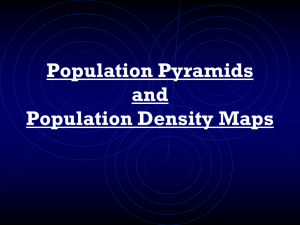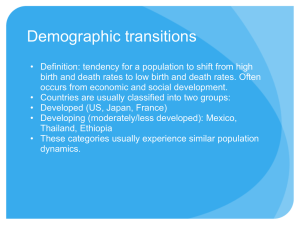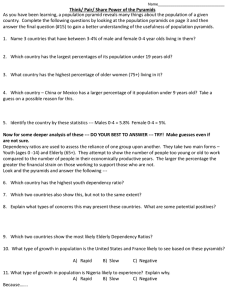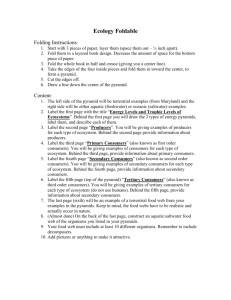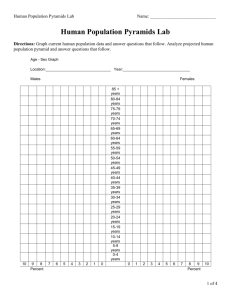Deforestation chels
advertisement
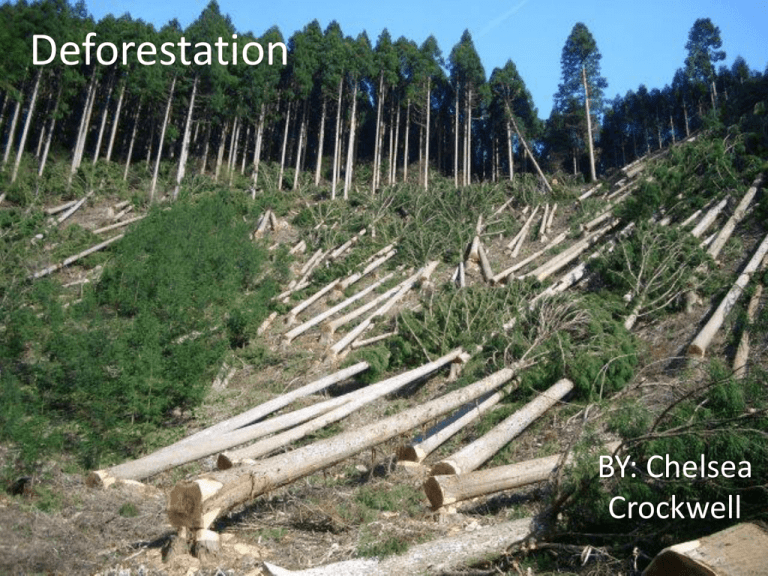
Deforestation BY: Chelsea Crockwell This will three discuss the three ToPresentation Understand the pyramids pyramids thatfirst explain food chains, you must understand someand in depthterms what is deforestation and definitions. and the effects it has. ENVIORNMENT Nicheis the AnAn ECOSYSTEM is an“role” ecological which ENVIORNMENT is each theunit conditions includes every single organism that lives in a organism has in the •that ABIOTICnon living surround analso organism; this particular area ; and includes all the non environment which it lives in; • BIOTICliving includes biotic and abiotic living features of thefactors local environment . where and when it feeds, what factors. REMEMBER THESE TWOactivities. TERMS!! it eats and its daily Energy that is stored in plants are transferred into other organisms in the ecosystem along food chains. Food chains can be expressed as pyramids. There are three types of pyramids. They are: Pyramids of Numbers, Pyramids of Biomass and Pyramids of Energy. Each link within a food chain is called trophic level. The area of each block within each pyramid expresses the size of the tropic level. PYRAMID OF NUMBERS Pyramids of Numbers show the numbers of the different organisms present in the community of a particular ecosystem. This pyramid is the easiest to produce due to that fact that you are simply counting the organisms that are seen. This however is not reliable and often gives a non-symmetrical pyramid. This happens due to the presence of small numbers of large organisms and vice versa. An example would be that there are more caterpillars then there are trees. Pyramids of Biomass are pyramids that measure the dry mass of an organism. Doing this will allow the production of a pyramid structure that is always symmetrical and always drawn to scale. The units of measurement for this type of pyramid are kilograms per square meter (kg/m2). Although this type a pyramid give such accurate results; gathering the raw data is difficult because it involves killing the organism to obtain the data. PYRAMID OF ENERGY Pyramids of Energy like its name measures the amount of energy that is present within the organism; the How does each pyramid measure the data, and units being kilojoules per square what may be encountered doing so? -2yr-1problems meter per year (kJm ). Which pyramid has the best method of collection and measuring data? Why? This set of data is extremely difficult to collect and measure, but they give the best picture of a food chain and are always symmetrical. It is beneficial because it gives more accurate pyramids then the Pyramids of Numbers and does not require killing organisms to obtain data such as Pyramids of Biomass. Benefits Forests include: Forests are of extremely important not only to provide a balance Absorption of a oxygen lot of rain fallin and encouragement of rain fall. of carbon dioxide and levels thethe atmosphere, but they The recycling minerals biomass within also provide habitatsoffor wildlife,from and being wood living and medicines for trees toeveryday decomposing soil. modern use. in Therefore deforestation abused causes Using CO2 in thewhich atmosphere it tofor oxygen. extreme loss the of resources can leadand to converting a lot of issues Providing preserving biodiversity, and medicines. bothhuman and and wildlife. for Problems that occur due to Deforestation: Reasons deforestation: are Nutrients and minerals Trees cut down for the are loss due to the interruption of the cycle of leaves of falling andand decomposing. production paper chip Wind erosion occurs because the land is exposed, and due to the fact board. that tree roots are no longer binding the soil together the soil structure Trees are cut down for the weakens. production of timber. Areas are susceptible to flooding due to the fact that forest absorbs the Woodlands areofremoved majority rain fall. to increase arealeads for to the extinction of wildlife, thus diminishing Losssurface of habitats agriculture. biodiversity. Loss ofare forest means less Woodlands removed for transpiration hence less rain; this leads to drought. production of modern Carbon dioxide levels increase thus contributing to global warming. development. Loss of resources to provide and discover chemicals found in plants to produce medicines. Within Britain alone forest coverage has decreased from being 85% to a merely 8%. Questions What to do NOW?? • • • • • Timber production- growing wood specifically to cut down. Species that grow quickly such as the pinefelling is typically Thisof method thescale amount of forest Explain how andused. burning trees reduces on a large could to be felled. affect the concentration of CO2 in the atmosphere? A traditional method of timber production is coppicing which is cutting trees like sweet chestnut down to the base so it still sprouts. For leisure management of woodlands can help tremendously by making habitats Both trees and slow growing hardwood trees such rapidly-growing as shrubs or leaving decaying leaf beds that supply habitats forgrow manyin tropical rainforest. When smalland area of trees beennature cut down it can organisms. Also having cleara paths open spaceshas so that and humans can commune in to a balance. return naturally being a tropical rain forest. Suggest and explain how reestablishment rainforest may occur in such areas? Habitats can beof conserved by ecosystem protecting areas. Examples of this are national parks, nature reserves; also restricting building permits on certain land, restricting urban development, industrial development and farming. Conversation of seed banks allows storage of seeds of different plant species. This helps to conserve endangered plants and different varieties of plant species. Reference Slide Images • A Review of Ecosystems Ecology (No Date) (Online Image) Available from: http://science.kennesaw.edu/~jdirnber/oceanography/LecuturesOceanogr/LecEcosystem/LecEco system.html Accessed: 25th April 2011 • Ecology- Biomass Pyramids (No Date) (Online Image) Available from: http://buffonescience9.wikispaces.com/Unit+4+-+Ecology Accessed: 26th April 2011 • Ecosystems-Components and classification of Ecosystems (16th February 2011) (Online Image) Available from: http://www.environmentabout.com/734/ecosystems-components-and- classification-ofecosystems Accessed: 26th April 2011 • Grasslands Ecosystems Food Pyramid (No Date) (Online Image) Available from: http://www.scienceart.com/image/?id=597&pagename=Grasslands_Ecosystem_Food_Pyramid • Murder is Everywhere (2nd May 2011) (Online Image) Available from: http://murderiseverywhere.blogspot.com/2011/05/trans-amazonian-highway.html Accessed: 3rd May 2011 • Startup Ecosystems (9th April 2010) (online Image) Available from: http://www.andysalo.com/2010/04/09/startup-ecosystems/ Accessed: 26th April 2011 • Willows as a diverse habitat benefitting pollinator incest's in early spring (May 2011) (Online Image) Available From: http://www.dave-cushman.net/bee/pollenthesis.html Accessed: 3rd May 2011 Print Exam Board AQA. CGP. “A2-Level Biology” New Castel: Coordination Group Publication Ltd. 2009. 38-39.Print.
